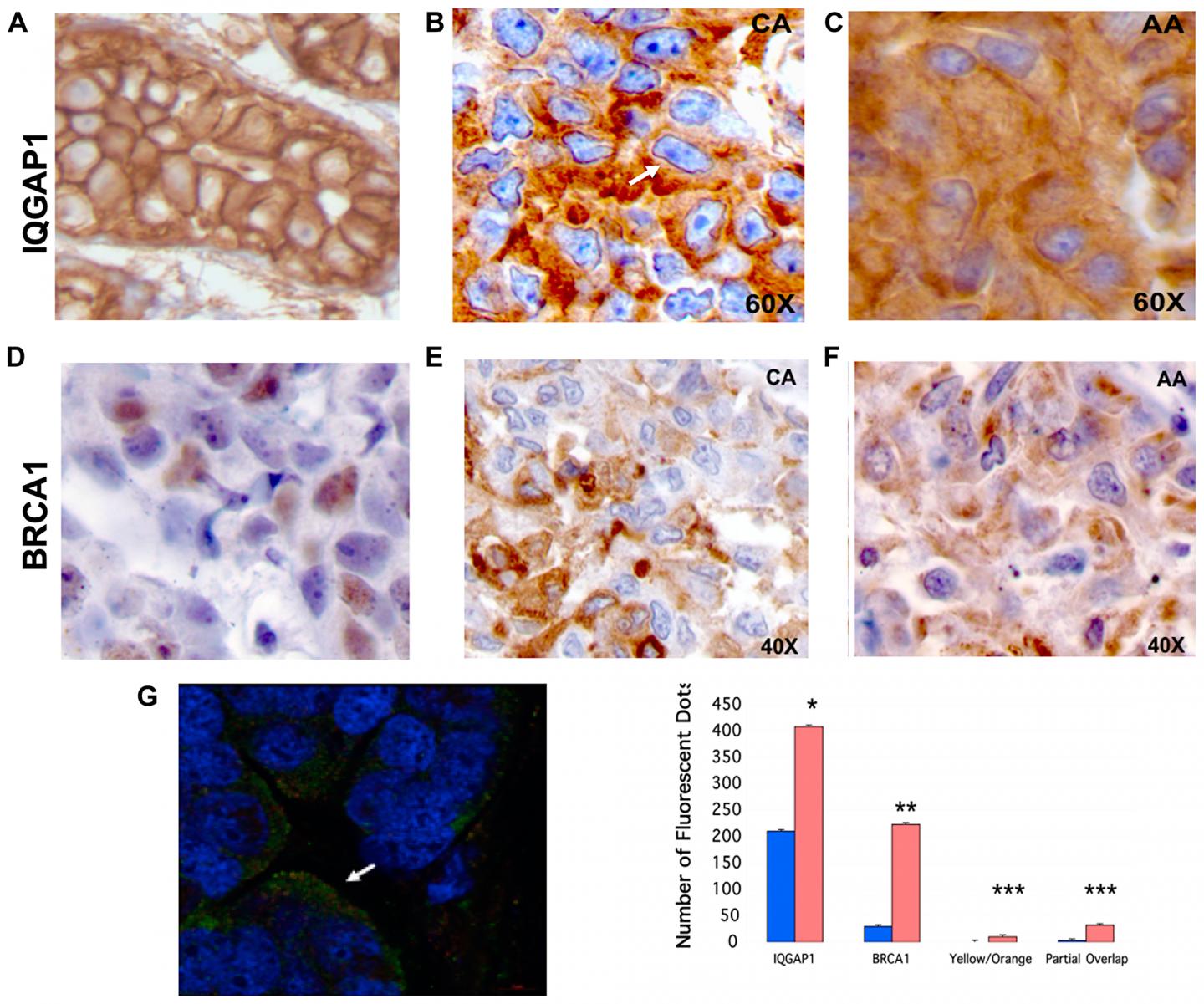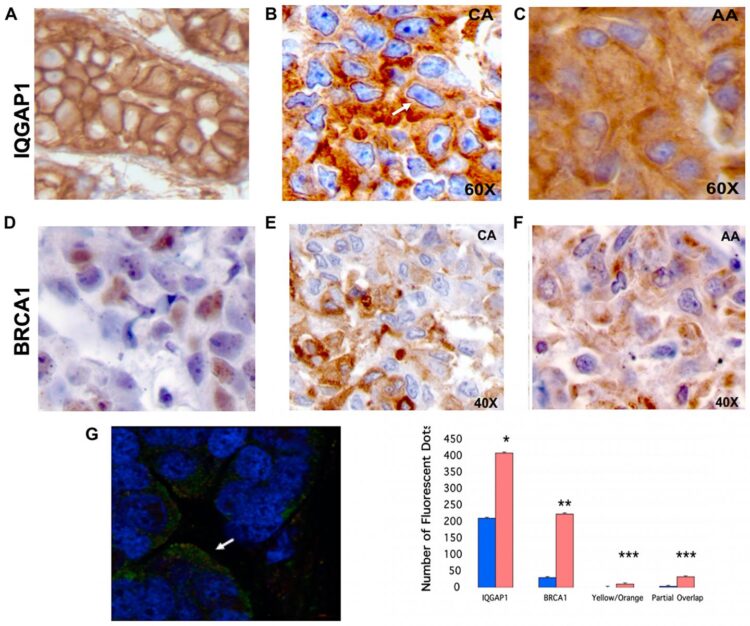The cover for issue 26 of Oncotarget features Figure 6, ‘Mislocalization of IQGAP1-BRCA1 in human TNBC tumors phenocopies the dominant mutants and the TNBC cells,’ by Osman, et al. and reported that IQGAP1 is a signaling scaffold implicated in TNBC

Credit: Correspondence to – Mahasin A. Osman – [email protected], [email protected].
The cover for issue 26 of Oncotarget features Figure 6, “Mislocalization of IQGAP1-BRCA1 in human TNBC tumors phenocopies the dominant mutants and the TNBC cells,” by Osman, et al. and reported that IQGAP1 is a signaling scaffold implicated in TNBC, but its mechanism is unknown.
Genetic mutant analyses suggest that phosphorylation cycling of IQGAP1 is important to its subcellular localization and centrosome-nuclear shuttling of BRCA1; dysfunction of this process defines two alternate mechanisms associated with cell proliferation.
TNBC cell lines and patient tumor tissues differentially phenocopy these mechanisms supporting the clinical existence of molecularly distinct variants of TNBC defined by IQGAP1 pathways.
The authors discuss a model in which IQGAP1 modulates centrosome-nuclear crosstalk to regulate cell division and imparts on cancer.
These findings have implications on cancer racial disparities and can provide molecular tools for classification of TNBC, presenting IQGAP1 as a common target amenable to personalized medicine
Dr. Mahasin A. Osman from The Department of Medicine, Division of Oncology, Health Sciences Campus at The University of Toledo as well as The Department of Molecular Pharmacology, Physiology and Biotechnology, Division of Biology and Medicine at Warren Alpert Medical School of Brown University said, “The triple-negative breast cancer (TNBC) is a highly heterogeneous group of diseases defined by absence of expression of growth factor and hormonal receptors, and thus it is highly lethal due to lack of diagnostic markers and therapeutic targets.”
In vitro depletion of BRCA1 results in amplified centrosomes, a phenotype observed in early-stage tumors, including breast cancer, but how might wild type BRCA1 protein control centrosome amplification is unclear.
While increased centrosome size resulting from PCM expansion has been reported as abnormality in human tumors, increased centrosome number is observed in 20–30% of tumors that overexpress oncogenes or lack tumor suppressors like BRCA1.
Centrosome amplification has been associated with high-grade tumors and poor prognosis and was suggested as a biomarker for advanced cancer.
Expression of dominant active mutants of IQGAP1 associates with amplified centrosomes while the expression of dominant-negative mutants associates with increased centrosome size.
The authors discuss a model whereby IQGAP1 acts as a signaling scaffold in the centrosome and influences centrosome protein transport, dysfunction of which underlie centrosome aberrations in cancer thereby presenting IQGAP1 as a common target in variants of TNBC, amenable to personalized medicine.
The Rotelli Research Team concluded in their Oncotarget Research Paper that taken together, the findings of this study underscore the importance of the delicate balance of expression, localization and/or modification of IQGAP1-BRCA1 and centrosome proteins in cell homeostasis and support that IQGAP1 influences BRCA1 transport or anchorage.
IQGAP1 may serve as a regulatory scaffold for BRCA1 and other centrosomal proteins to regulate their stability or transport between the nucleus and the centrosome, a mechanism by which it modulates nuclear-centrosome crosstalk during the cell cycle and thus regulates cell proliferation.
Furthermore, as IQGAP1 has been implicated in various carcinomas, the mechanisms discussed here likely apply to a wide range of carcinoma, thus presenting IQGAP1 as a non-organ-specific clinical target amenable to precision medicine.
“The mechanisms discussed here likely apply to a wide range of carcinoma, thus presenting IQGAP1 as a non-organ-specific clinical target amenable to precision medicine.”
###
Sign up for free Altmetric alerts about this article
DOI – https:/
Full text – https:/
Correspondence to – Mahasin A. Osman – [email protected], [email protected].
Keywords –
IQGAP1,
BRCA1,
β-catenin,
MNK1,
triple negative breast cancer
About Oncotarget
Oncotarget is a weekly, peer-reviewed, open access biomedical journal covering research on all aspects of oncology.
To learn more about Oncotarget, please visit https:/
SoundCloud – https:/
Facebook – https:/
Twitter – https:/
LinkedIn – https:/
Pinterest – https:/
Reddit – https:/
Oncotarget is published by Impact Journals, LLC please visit http://www.
Media Contact
[email protected]
18009220957×105
Media Contact
Ryan James Jessup
[email protected]
Original Source
https:/
Related Journal Article
http://dx.





